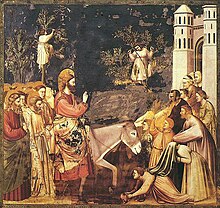Unequal sons
That the Matthew's special material attributable parable of the two sons is in the Gospel of Matthew , Chapter 21.28 to 32 EU says.
prehistory
Jesus was riding on a donkey ( Zech 9,9 EU ) with his disciples to Jerusalem ( Mt 21,1-10 EU ). He drove money changers and traders out of the temple precinct. Then the lame and the sick came to him in the temple courtyard, whom he healed; Children joined them singing ( Mt 21,12–16 EU ). In the evening he retired to Bethany . The next day he cursed the fig tree , which soon withered ( Mt 21 : 18-22 EU ). High priestly Pharisees and elders asked him the question of authority about his actions. He did not answer the question, but asked a counter-question, which in turn was not answered ( Mt 21 : 23-27 EU ).
The parable
The parable begins with the open question : “What do you think?”. Now Jesus told a parable. One man had two children. He asks both of them to work in the vineyard . The first boy doesn't want to, later he regretted it and went to the vineyard after all. He says the same thing to the second son. The latter answers the father's question somewhat reverently, but does not go. Both behaviors were known to the listeners present. Jesus now asks the priests and elders who are present, which of the two children has fulfilled the will of the father. All listeners answer the same - the first, the naysayer, who later repents and does the Father's will.
Interpretations
Jesus uses a situation that is typical for poor families: children have to contribute to their maintenance very early, sometimes from the age of 6. The children are supposed to work in a vineyard. The father in the parable does not criticize, but his sympathy and that of the listener belongs to the first child, who at first refuses and then works. In this role Jesus sees that part of the religious upper class that he seeks to win, but which (still) count among his opponents. You should now finally follow the example of the tax collectors and prostitutes and trust the justice, the observance of which leads to the kingship of God.
literature
→ see also the sections in the relevant commentaries (especially Luz, Gnilka) and the works on biblical parables
- WD Davies, Dale C. Allison: A Critical and Exegetical Commentary on the Gospel According to Saint Matthew . Volume 3: Commentary on Matthew XIX – XXVIII . T. & T. Clark, Edinburgh 1997, ISBN 0-567-08518-X , ( The international critical commentary on the Holy scriptures of the Old and New Testaments ).
- François Genuyt: Matthieu 21 . In: Sémiotique et bible 85, 1997, ISSN 0154-6902 , pp. 47-62.
- Pierre Grelot: Les Paroles de Jésus Christ . Desclée, Paris 1986, ISBN 2-7189-0293-0 , ( Introduction a la Bible . Volume 3: Nouveau Testament 7).
- Arland J. Hultgren: The Parables of Jesus. A Commentary . Paperback edition. Eerdmans, Grand Rapids MI 2002, ISBN 0-8028-6077-X , ( The Bible in its world ), 218ff. ( Digitized at googlebooks ).
- Joachim Jeremias : The parables of Jesus . Short edition. 9th edition. Vandenhoeck & Ruprecht, Göttingen 1984, ISBN 3-525-33498-2 , ( Kleine Vandenhoeck series 1500), pp. 84f.
- Ulrich Luz : The Gospel according to Matthew . Volume 3: Mt 18-25 . Benziger et al., Zurich et al. 1997, ISBN 3-545-23129-1 , ( Evangelical-Catholic Commentary on the New Testament - EKK Department 1).
- John P. Meier: A Marginal Jew. Rethinking of the Historical Jesus . Part 1: The roots of the problem and the person . Doubleday et al., New York NY et al. 1991, ISBN 0-385-26425-9 .
- Wesley G. Olmstead: Matthew's trilogy of parables. The nation, the nations and the reader in Matthew 21: 28-22: 14 . Cambridge University Press, Cambridge et al. 2003, ISBN 0-521-83154-7 , ( Society for New Testament Studies monograph series 127), (Also: London, King's College, Diss., 1999).
- Luise Schottroff : The parables of Jesus. Gütersloher Verlagshaus, Gütersloh 2005, ISBN 3-579-05200-4 , pp. 286-288.
